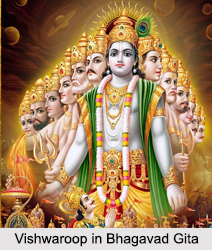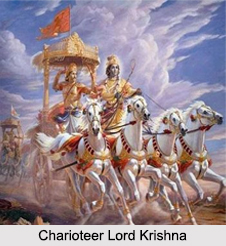 Mahabharata is the epic poem by saint Ved Vyas, divided into several verses, comprising the Herculean episodes of antagonism and mental torrents to lust for power amongst two bands of brothers, Pandavas and Kauravas. The culmination of these undercurrents led to the magnum battle of Kurukshetra, deciding the fate of each brother. However, prior to the battle, when every single soul had prepared to go to war, Arjuna, the third Pandava and a master in archery, had completely refused to fight his kin and elders. He had thus shunned all weapons with all defeat and depression, asking his charioteer Lord Krishna to explain to him the need to battle his own. Krishna had then taken initiative to drive home the real meaning of life and work to Arjuna, initiating the format of Bhagavad Gita. Divinity in Bhagavad Gita is one such sermon that was advocated by the Lord, not only to Arjuna, but also to following generations in general.
Mahabharata is the epic poem by saint Ved Vyas, divided into several verses, comprising the Herculean episodes of antagonism and mental torrents to lust for power amongst two bands of brothers, Pandavas and Kauravas. The culmination of these undercurrents led to the magnum battle of Kurukshetra, deciding the fate of each brother. However, prior to the battle, when every single soul had prepared to go to war, Arjuna, the third Pandava and a master in archery, had completely refused to fight his kin and elders. He had thus shunned all weapons with all defeat and depression, asking his charioteer Lord Krishna to explain to him the need to battle his own. Krishna had then taken initiative to drive home the real meaning of life and work to Arjuna, initiating the format of Bhagavad Gita. Divinity in Bhagavad Gita is one such sermon that was advocated by the Lord, not only to Arjuna, but also to following generations in general.
Lord Shri Krishna explained to Arjuna to listen to His supreme advice, which He had wished to give to him for the sake of his (Arjuna) welfare, because he considered Arjuna his loved one. Neither the professors of divinity, nor the great ascetics are aware of His origin, because He is the source of them all. He who is aware of Him as the unborn, without beginning, the Lord of the universe, is stripped of his delusions and becomes free from all conceivable sin. Recognition of divinity in Bhagavad Gita perhaps tries to underline this very fact poignantly. Intelligence, wisdom, non-illusion, compassionate, truth, self-discipline, composure, pleasure, pain, birth, death, fear and fearlessness; harmlessness, equanimity, contentment, austerity, beneficence, fame and failure, all these are precisely some of the characteristics of beings, which spring from the Lord Himself. The seven Great Seers, the Progenitors of mankind, the Ancient Four and the Lawgivers, were born of His Will and came forth direct from Him. The race of mankind has in fact sprung from them. He who rightly understands the Almighty`s manifested glory and His Creative Power, beyond doubt attains perfect Peace. He is the source of sufferings; everything flows from Him. Thus, the wise worship Him with unfaltering devotion. Krishna says, "With minds concentrated on Me, with lives absorbed in Me, and enlightening each other, they ever feel content and happy."
To those who are always committed and who worship Him with love, He showers them with power of discrimination, which leads them eventually to Him. Such is the power of divinity as stated in Bhagavad Gita. By the Lord`s grace, He dwells in the hearts of each believer; and He drives out the darkness of ignorance by the glistening light of wisdom. Arjuna at this point had questioned Krishna, "Thou art the Supreme Spirit, the Eternal Home, the Holiest of the Holy, the Eternal Divine Self, the Primal God, the Unborn, and the Omnipresent." This was also repeated by the seers and the divine sage Narada, including erudite men like Asita, Devala and Ved Vyas; and this was strongly also referred by Krishna Himself. According to Arjuna, he vehemently believed in what his Lord had said to him till now, for neither the godly nor the godless comprehend His manifestation. Krishna alone is aware of Himself, owing to the power of His Supreme self; He being the Supreme Spirit, the Source and Master of all being, the Lord of Lords, the Ruler of the Universe. Arjuna was longing to become aware of His charioteer`s glorious manifestations, by means of which He pervades the universe. He urged to become known, become aware that how would he, by constant meditation, get to comprehend his Lord. "What are Thy various manifestations through which I am to meditate on Thee? Tell me again, I pray, about the fullness of Thy power and Thy glory; for I feel that I am never satisfied when I listen to Thy immortal words."
Shri Krishna, with his everlasting smiling facade answered to Arjuna "So be it, My beloved friend! I will unfold to thee some of the chief aspects of My glory. Of its full extent there is no end." Divinity in Bhagavad Gita is wondrously explicated by Krishna, when he gradually prepared to display to Arjuna his Vishvarupa, the all-pervasiveness of the Almighty. Lord Krishna expressed that He is the Self, embedded within the hearts of all beings; He is the beginning and the life and he is the end of them all. He is the creator of every creative power, He represents the Sun amongst all luminaries; he is the whirlwind within winds and the Moon amongst planets. Of the Vedas he represents the Hymns; Krishna, the Almighty is the Electric Force within the Powers of Nature; of the senses He is the Mind; and He upholds the Intelligence in all that exists.
 Amongst Forces of Vitality He is the Life, He represents the Mammon to the heathen and the godless; He is the Energy in fire, earth, wind, sky, heaven, sun, moon and planets; and among mountains He stands as the lofty Mount Meru. Among the priests, He represents the Apostle Brihaspati, from amongst the generals He is Skanda the Commander-in-Chief; and of waters he is the Ocean. From the bunch of great seers Krishna represents Bhrigu, from amongst the words He is Om, of offerings He is the silent prayer, He guards as the Himalayas from within the immovable. From amongst the trees he is the sacred Fig-tree, of the Divine Seers He represents Narada, from the heavenly singers He is Chitraratha, their Leader and of sages, He is the high-ranking Kapila.
Amongst Forces of Vitality He is the Life, He represents the Mammon to the heathen and the godless; He is the Energy in fire, earth, wind, sky, heaven, sun, moon and planets; and among mountains He stands as the lofty Mount Meru. Among the priests, He represents the Apostle Brihaspati, from amongst the generals He is Skanda the Commander-in-Chief; and of waters he is the Ocean. From the bunch of great seers Krishna represents Bhrigu, from amongst the words He is Om, of offerings He is the silent prayer, He guards as the Himalayas from within the immovable. From amongst the trees he is the sacred Fig-tree, of the Divine Seers He represents Narada, from the heavenly singers He is Chitraratha, their Leader and of sages, He is the high-ranking Kapila.
Krishna also wanted Arjuna to know that from among horses he represented the Pegasus, the heaven-born; among the lordly elephants He is the White one and He is the true Ruler among men. He is the Thunderbolt among weapons; the Cow of Plenty from amongst cows, He represents passion from those who procreate and the Cobra among serpents. Krishna represents the King-python from among snakes, the Aqueous Principle among those that live in water; He represents the Father from amongst fathers and Death from within the rulers. He is the devotee Prahlad from among the heathens; within time he represents the Eternal Present; He represents the Lion from among beasts and the Eagle among birds. He is the Wind among the purifiers, King Rama from amongst warriors, the Crocodile among the fishes, and the Ganges among the rivers. Krishna represents the Beginning, the Middle and the End in creation; among sciences He is the science of Spirituality; He represents Discussion from amongst disputants. From within letters he represents A; He represents the copulative amongst compound words; He is Time inexhaustible; and He is the all-pervading Preserver. Divinity in Bhagavad Gita is also represented in actuality when Krishna continues to reveal his each creation, explaining that He represents all-devouring Death; He is the Origin of all that will happen; He is Fame, Fortune, Speech, Memory, Intellect, Constancy and Forgiveness.
From within the hymns Krishna is Brihatsama, from within the metres Krishna represents Gayatri, among the months He is Margasheersha (December); and He is the Spring among seasons. Krishna, the Almighty represents the Gambling of the cheat and the Splendour of the splendid; He is Victory; He is Effort; and He also is Purity of the pure. "I am Shri Krishna among the Vrishni-clan, and Arjuna among the Pandavas; of the saints I am Vyasa, and I am the Shukracharya among the sages. I am the Sceptre of rulers, the Strategy of the conquerors, the Silence of mystery, the Wisdom of the wise." Krishna is the Seed of all being. No creature moving or unmoving can live without Him. The aspects of His divine life are eternal. Whatever is glorious, exceptional, beautiful and mighty, one can be assured about that it comes from a fragment of His splendour only. Divinity in Bhagavad Gita finds proud mention, when Lord Krishna divulges entirely his real Supreme Self to the very puzzled Arjuna. The genuine divine self slowly comes to light. Krishna verily sustains this universe with only a small part of Himself.



















